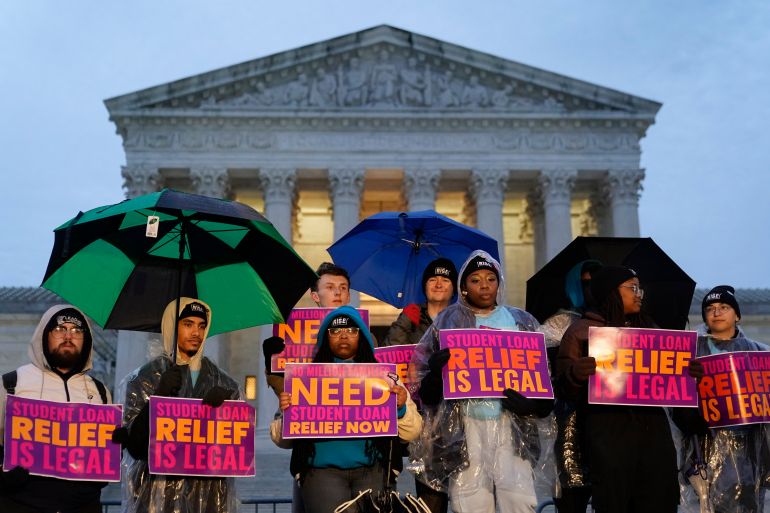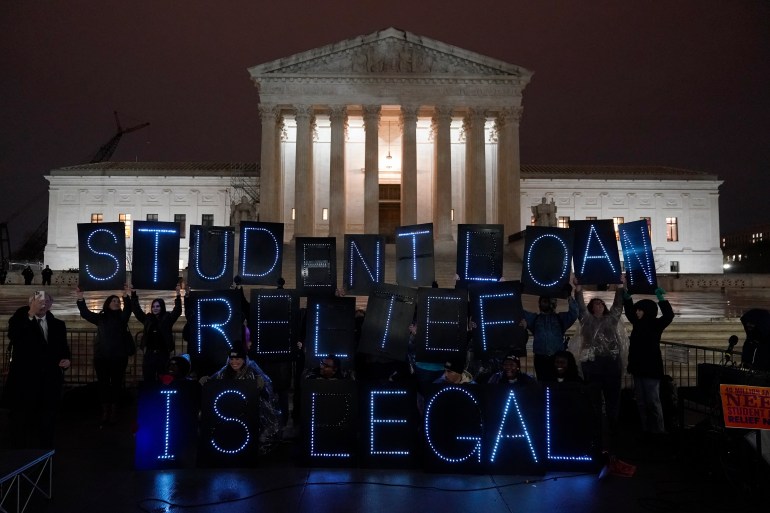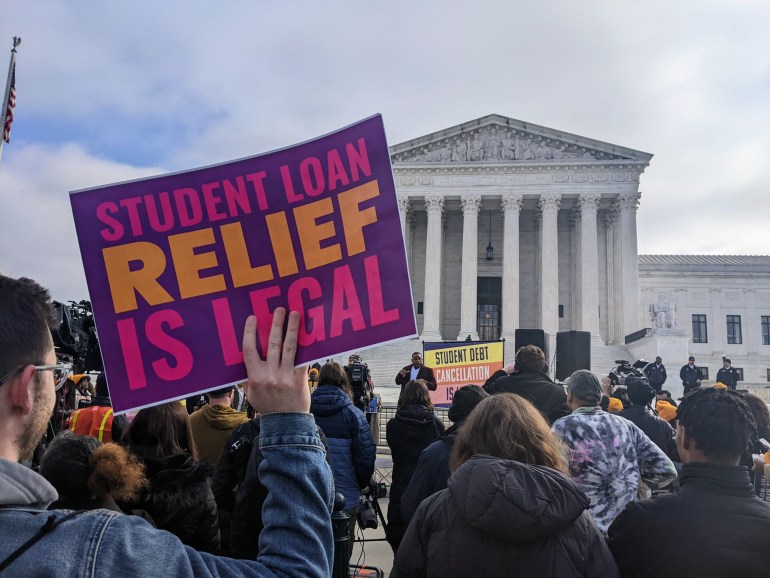US Supreme Court weighs Biden’s college student debt relief
President Joe Biden wants to forgive student debt for millions with education loans, but critics argue he overstepped his authority.

The fate of US President Joe Biden’s plan to cancel $430bn in student debt for 40 million borrowers is in the hands of the Supreme Court in a case that presents another major test of executive branch authority in the United States.
The nine justices heard arguments on Tuesday in the Biden administration’s appeal of two lower court rulings blocking the policy that he announced in August. The legal challenges were brought by six conservative-leaning states and two student loan borrowers opposed to the plan’s eligibility requirements.
Keep reading
list of 4 itemsWhite House defends US student loan forgiveness amid criticism
Key things to know about Joe Biden’s student loan plan
Biden administration to cancel at least $10K in student loan debt
Under the president’s plan, the US government would forgive up to $10,000 in federal student debt for Americans making under $125,000 who took out loans to pay for college and other post-secondary education. That amount would go up to $20,000 for recipients of Pell grants awarded to students from lower-income families.
The programme fulfilled Biden’s 2020 campaign promise to cancel a portion of the nation’s $1.6 trillion in federal student loan debt, but was criticised by Republicans as an overreach of his authority.
Biden’s administration has said the plan is authorised under a 2003 federal law called the Higher Education Relief Opportunities for Students Act, or HEROES Act, which allows student loan debt relief during wartime or national emergencies.

US Solicitor General Elizabeth Prelogar, arguing on behalf of Biden’s administration on Tuesday, faced sceptical questions from several conservative justices.
John Roberts, the chief justice, questioned whether the scale of the relief could be considered a mere modification of an existing student loan programme. “We’re talking about half a trillion dollars and 43 million Americans. How does that fit under the normal understanding of ‘modify’?” Roberts asked.
Prelogar acknowledged that the debt relief is an “economically significant action”. But she said that “national policies these days frequently do involve more substantial costs or trigger political controversy”.
Prelogar added that Biden’s plan “is not an assertion of regulatory authority at all. This is the administration of a benefits programme.”
The top court’s 6-3 conservative majority has previously invalidated Biden policies that it said lacked clear congressional authorisation.
Many borrowers experienced financial strain during the COVID-19 pandemic, a declared public health emergency. Beginning in 2020, the administrations of President Donald Trump, a Republican, and Biden, a Democrat, repeatedly paused federal student loan payments and halted interest from accruing, relying upon the HEROES Act to do so.
Biden’s administration contends that the challengers have not suffered the sort of legal injury needed to give them the proper standing to bring their lawsuits. The challengers have said the Biden administration failed to provide an adequate legal underpinning for the programme.
One of these plaintiffs has student debt but does not qualify for debt forgiveness under Biden’s plan because it is privately held. The other plaintiff does not qualify for the full amount.
In the legal challenge brought by individual borrowers Myra Brown and Alexander Taylor, Texas-based US District Court Judge Mark Pittman ruled the student loan forgiveness programme lacked “clear congressional authorization”. The New Orleans-based 5th US Circuit Court of Appeals declined to put Pittman’s decision on hold pending an appeal.
Missouri-based US District Court Judge Henry Autrey found the states Arkansas, Iowa, Kansas, Missouri, Nebraska and South Carolina lacked the legal standing to sue. On appeal, the St Louis-based 8th US Circuit Court of Appeals found at a minimum that Missouri likely had standing to sue, and that court temporarily blocked the Biden programme from taking effect while the case proceeded.
‘It means everything’
Dozens of student debt relief advocates gathered outside the top court in Washington, DC, earlier on Tuesday as the justices were set to hear oral arguments. “Education is a right,” the demonstrators chanted.
Carmel Pryor, senior director of communications at the advocacy group Alliance for Youth Action, said addressing the student debt problem is a “moral issue” that would make an enormous difference in the lives of young people across the country.
“It means everything,” Pryor told Al Jazeera. “It would be incredible if the Supreme Court were on the side of the people for once.”

Some critics of Biden’s move say debt relief fails to address the root cause of the problem: the ballooning cost of college education. But Pryor said the programme is an important “first step” in a push for greater education reform, including cancelling all student debt and making public colleges free.
She also dismissed any potential harm the relief might cause to the economy, saying student loan payments have been on hold for three years during the pandemic and the “sky hasn’t fallen”.
Supporters of student loan forgiveness often frame the college debt crisis as a racial justice issue, noting that communities of colour with less generational wealth are more likely to borrow money for higher education and struggle to pay it.
Omamus Oghene, a student at the University of Virginia, said the extra $10,000 in relief for lower-income families will especially help close the racial wealth gap in the US.
“The Pell Grant is [for] a lot of Black and brown people, a lot of poor students, a lot of first-generation students, a lot of students whose parents didn’t go to college,” Oghene told Al Jazeera. “So that additional $10,000 is meant to close the gap a little bit. It’s not going to close it all the way, but it’s a good step in the right direction.”
Daniel Grandison, a student at North Carolina Agricultural and Technical State University, said his mother is still paying off her student debts while he is amassing his own.
“It’s leaving us behind. We can’t really get up all the way yet,” he said.
Asked whether he thinks the top court will allow debt relief to go into effect, Grandison said: “I’m hoping we get our relief. But that’s just hope. … It’s really up to the Supreme Court. I’m praying because it would be great.”
Ali Harb contributed reporting from Washington, DC.